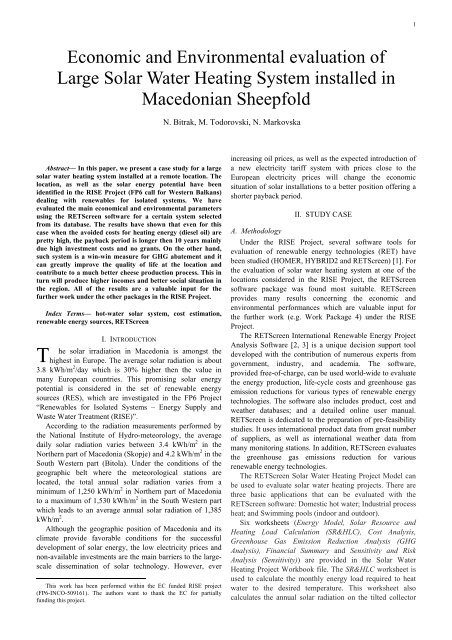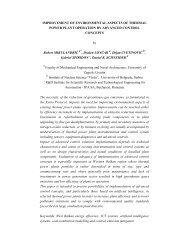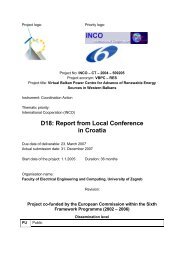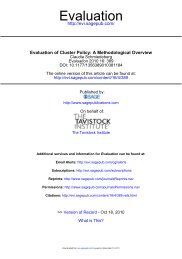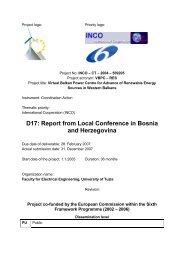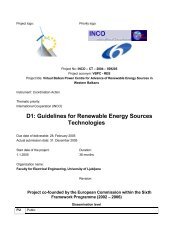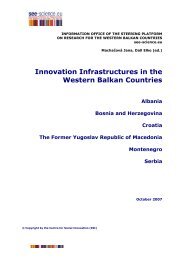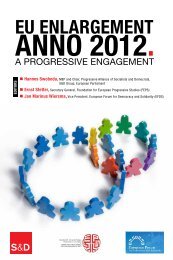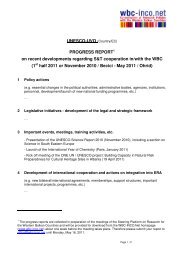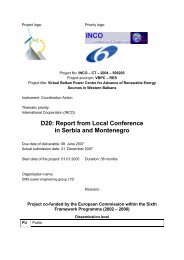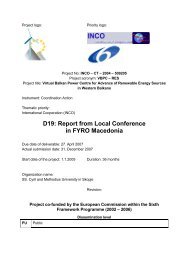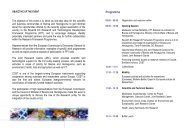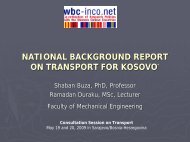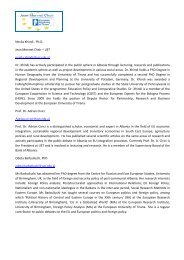Prva stran - WBC-INCO Net
Prva stran - WBC-INCO Net
Prva stran - WBC-INCO Net
You also want an ePaper? Increase the reach of your titles
YUMPU automatically turns print PDFs into web optimized ePapers that Google loves.
Economic and Environmental evaluation of<br />
Large Solar Water Heating System installed in<br />
Macedonian Sheepfold<br />
Abstract— In this paper, we present a case study for a large<br />
solar water heating system installed at a remote location. The<br />
location, as well as the solar energy potential have been<br />
identified in the RISE Project (FP6 call for Western Balkans)<br />
dealing with renewables for isolated systems. We have<br />
evaluated the main economical and environmental parameters<br />
using the RETScreen software for a certain system selected<br />
from its database. The results have shown that even for this<br />
case when the avoided costs for heating energy (diesel oil) are<br />
pretty high, the payback period is longer then 10 years mainly<br />
due high investment costs and no grants. On the other hand,<br />
such system is a win-win measure for GHG abatement and it<br />
can greatly improve the quality of life at the location and<br />
contribute to a much better cheese production process. This in<br />
turn will produce higher incomes and better social situation in<br />
the region. All of the results are a valuable input for the<br />
further work under the other packages in the RISE Project.<br />
Index Terms— hot-water solar system, cost estimation,<br />
renewable energy sources, RETScreen<br />
T<br />
I. INTRODUCTION<br />
he solar irradiation in Macedonia is amongst the<br />
highest in Europe. The average solar radiation is about<br />
3.8 kWh/m 2 /day which is 30% higher then the value in<br />
many European countries. This promising solar energy<br />
potential is considered in the set of renewable energy<br />
sources (RES), which are investigated in the FP6 Project<br />
“Renewables for Isolated Systems – Energy Supply and<br />
Waste Water Treatment (RISE)”.<br />
According to the radiation measurements performed by<br />
the National Institute of Hydro-meteorology, the average<br />
daily solar radiation varies between 3.4 kWh/m 2 in the<br />
Northern part of Macedonia (Skopje) and 4.2 kWh/m 2 in the<br />
South Western part (Bitola). Under the conditions of the<br />
geographic belt where the meteorological stations are<br />
located, the total annual solar radiation varies from a<br />
minimum of 1,250 kWh/m 2 in Northern part of Macedonia<br />
to a maximum of 1,530 kWh/m 2 in the South Western part<br />
which leads to an average annual solar radiation of 1,385<br />
kWh/m 2 .<br />
Although the geographic position of Macedonia and its<br />
climate provide favorable conditions for the successful<br />
development of solar energy, the low electricity prices and<br />
non-available investments are the main barriers to the largescale<br />
dissemination of solar technology. However, ever<br />
This work has been performed within the EC funded RISE project<br />
(FP6-<strong>INCO</strong>-509161). The authors want to thank the EC for partially<br />
funding this project.<br />
N. Bitrak, M. Todorovski, N. Markovska<br />
increasing oil prices, as well as the expected introduction of<br />
a new electricity tariff system with prices close to the<br />
European electricity prices will change the economic<br />
situation of solar installations to a better position offering a<br />
shorter payback period.<br />
A. Methodology<br />
II. STUDY CASE<br />
Under the RISE Project, several software tools for<br />
evaluation of renewable energy technologies (RET) have<br />
been studied (HOMER, HYBRID2 and RETScreen) [1]. For<br />
the evaluation of solar water heating system at one of the<br />
locations considered in the RISE Project, the RETScreen<br />
software package was found most suitable. RETScreen<br />
provides many results concerning the economic and<br />
environmental performances which are valuable input for<br />
the further work (e.g. Work Package 4) under the RISE<br />
Project.<br />
The RETScreen International Renewable Energy Project<br />
Analysis Software [2, 3] is a unique decision support tool<br />
developed with the contribution of numerous experts from<br />
government, industry, and academia. The software,<br />
provided free-of-charge, can be used world-wide to evaluate<br />
the energy production, life-cycle costs and greenhouse gas<br />
emission reductions for various types of renewable energy<br />
technologies. The software also includes product, cost and<br />
weather databases; and a detailed online user manual.<br />
RETScreen is dedicated to the preparation of pre-feasibility<br />
studies. It uses international product data from great number<br />
of suppliers, as well as international weather data from<br />
many monitoring stations. In addition, RETScreen evaluates<br />
the greenhouse gas emissions reduction for various<br />
renewable energy technologies.<br />
The RETScreen Solar Water Heating Project Model can<br />
be used to evaluate solar water heating projects. There are<br />
three basic applications that can be evaluated with the<br />
RETScreen software: Domestic hot water; Industrial process<br />
heat; and Swimming pools (indoor and outdoor).<br />
Six worksheets (Energy Model, Solar Resource and<br />
Heating Load Calculation (SR&HLC), Cost Analysis,<br />
Greenhouse Gas Emission Reduction Analysis (GHG<br />
Analysis), Financial Summary and Sensitivity and Risk<br />
Analysis (Sensitivity)) are provided in the Solar Water<br />
Heating Project Workbook file. The SR&HLC worksheet is<br />
used to calculate the monthly energy load required to heat<br />
water to the desired temperature. This worksheet also<br />
calculates the annual solar radiation on the tilted collector<br />
1


